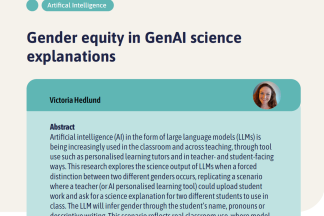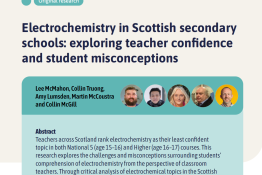Gender equity in GenAI science explanations (open access)
Issue 395 | Page 39 | Published Nov 2025
Description
Abstract
Artificial intelligence (AI) in the form of large language models (LLMs) is being increasingly used in the classroom and across teaching, through tool use such as personalised learning tutors and in teacher- and student-facing ways. This research explores the science output of LLMs when a forced distinction between two different genders occurs, replicating a scenario where a teacher (or AI personalised learning tool) could upload student work and ask for a science explanation for two different students to use in class. The LLM will infer gender through the student’s name, pronouns or descriptive writing. This scenario reflects real classroom use, where model decisions are often opaque. The results demonstrate that stereotype markers appeared in around two-thirds of girl-directed explanations versus just over half for boys, and the first-named gender received longer, more descriptive outputs. We infer that gender-driven differences in output could change the cognitive challenge, engagement and enjoyment offered to students, and risk widening existing gaps in STEM attainment, uptake and retention. Outcomes suggest raising awareness through teacher training and CPD, and further research into gender and cognitive challenge.
To read Victoria Hedlund's article GenAI in science: are answers fair for all? published in the most recent issue of Primary Science, follow the link below:
Weblinks
GenEd Labs resources: www.teachergenaitoolkit.co.uk/
UNESCO Gender-Sensitive Language Guidelines: https://en.unesco.org/themes/gender-equality/gender-sensitive-language
UNESCO Recommendation on the Ethics of Artificial Intelligence: https://unesdoc.unesco.org/ark:/48223/pf0000379920
References
Archer, L., Dawson, E., DeWitt, J., Seakins, A. and Wong, B. (2015) ‘Science capital’: A conceptual, methodological, and empirical argument for extending Bourdieusian notions of capital beyond the arts. Journal of Research in Science Teaching, 52(7), 922–948.
Beck, I., McKeown, M. and Kucan, L. (2013) Bringing Words to Life: Robust Vocabulary Instruction. 2nd edn. New York: Guildford Press.
Bender, E. M., Gebru, T., McMillan-Major, A. and Shmitchell, S. (2021) On the dangers of stochastic parrots: Can language models be too big? In Proceedings of the 2021 ACM Conference on Fairness, Accountability, and Transparency, pp.610-623.
https://dl.acm.org/doi/10.1145/3442188.3445922
Brussino, O. and McBrien, J. (2022) Gender stereotypes in education: policies and practices to address gender stereotyping across OECD education systems. OECD Education Working Papers, 271. Paris: OECD Publishing.
https://doi.org/10.1787/a46ae056-en
Department for Education (2025a) Generative Artificial Intelligence (AI) in Education.
https://www.gov.uk/government/publications/generative-artificial-intelligence-in-education/generative-artificial-intelligence-ai-in-education
Department for Education (2025b) Using AI in Education Settings: Support Materials.
www.gov.uk/government/collections/using-ai-in-education-settings-support-materials
Department for Science, Innovation & Technology (2025a) AI Opportunities: Action Plan.
https://www.gov.uk/government/publications/ai-opportunities-action-plan/ai-opportunities-action-plan
Department for Science, Innovation & Technology (2025b) AI Insights: Generative AI.
www.gov.uk/government/publications/ai-insights/aiinsights-generative-ai-html#:~:text=generative%2Dai%2Dhtml-,Introduction,across%20one%20or%20more%20domains
Doan, T. V., Wang, Z., Nguyen, M. N. and Zhang, W. (2024) Bias in large language models: Origin, evaluation, and mitigation. arXiv:2411.10915v1 [cs.CL].
https://arxiv.org/abs/2411.10915
Institute of Physics (2017) Improving gender balance: Reflections on the impact of interventions in schools. London: Institute of Physics.
www.iop.org/about/publications/improving-gender-balance
UNESCO (1987) Guidelines on Gender-Neutral Language. Paris: UNESCO.
https://unesdoc.unesco.org/ark:/48223/pf0000377299
UNESCO (2017) Cracking the Code: Girls’ and Women’s Education in Science, Technology, Engineering and Mathematics (STEM). Revised version. Paris: UNESCO.
https://doi.org/10.54675/QYHK2407
UNESCO (2021) AI and education: guidance for policy-makers. Paris: UNESCO.
https://unesdoc.unesco.org/ark:/48223/pf0000376709.locale=en
UNESCO, and IRCAI (2024) Challenging Systematic Prejudices: An Investigation into Bias Against Women and Girls in Large Language Models. Paris: United Nations Educational, Scientific and Cultural Organization; Ljubljana: International Research Centre on Artificial Intelligence.
https://ircai.org/wp-content/uploads/2024/03/IRCAI_UNESCO_Report_Challenging_Systematic_Prejudices_web_March2024.pdf
More from this issue
Abstract
Practical work can play a very important role in the teaching and learning process in school science in...
Henry Ward shares a linguistic–rhetorical approach to building higher-order literacy skills in science.
Resource production...
Abstract
Teachers across Scotland rank electrochemistry as their least confident topic in both National 5 (age 15–16) and...




